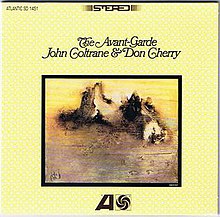Free jazz, or free form in the early to mid-1970s, is a style of avant-garde jazz or an experimental approach to jazz improvisation that developed in the late 1950s and early 1960s, when musicians attempted to change or break down jazz conventions, such as regular tempos, tones, and chord changes. Musicians during this period believed that the bebop and modal jazz that had been played before them was too limiting, and became preoccupied with creating something new. The term "free jazz" was drawn from the 1960 Ornette Coleman recording Free Jazz: A Collective Improvisation. Europeans tend to favor the term "free improvisation". Others have used "modern jazz", "creative music", and "art music".

Randolph Denard Ornette Coleman was an American jazz saxophonist, trumpeter, violinist, and composer. He is best known as a principal founder of the free jazz genre, a term derived from his 1960 album Free Jazz: A Collective Improvisation. His pioneering works often abandoned the harmony-based composition, tonality, chord changes, and fixed rhythm found in earlier jazz idioms. Instead, Coleman emphasized an experimental approach to improvisation rooted in ensemble playing and blues phrasing. Thom Jurek of AllMusic called him "one of the most beloved and polarizing figures in jazz history," noting that while "now celebrated as a fearless innovator and a genius, he was initially regarded by peers and critics as rebellious, disruptive, and even a fraud."

Donald Eugene Cherry was an American jazz trumpeter, bandleader, and multi-instrumentalist. Beginning in the late 1950s, he had a long tenure performing in the bands of saxophonist Ornette Coleman, including on the pioneering free jazz albums The Shape of Jazz to Come (1959) and Free Jazz: A Collective Improvisation (1961). Cherry also collaborated separately with musicians including John Coltrane, Charlie Haden, Sun Ra, Ed Blackwell, the New York Contemporary Five, and Albert Ayler.

Charles Edward Haden was an American jazz double bass player, bandleader, composer and educator whose career spanned more than fifty years. Haden helped to revolutionize the harmonic concept of bass playing in jazz, evolving a style that sometimes complemented the soloist, and other times moved independently, liberating bassists from a strictly accompanying role.

The Shape of Jazz to Come is the third album by the jazz musician Ornette Coleman. Released on Atlantic Records in 1959, it was his debut on the label and his first album featuring the working quartet including himself, trumpeter Don Cherry, bassist Charlie Haden, and drummer Billy Higgins. The recording session for the album took place on May 22, 1959, at Radio Recorders in Hollywood, California. Although Coleman initially wished for the album to be titled Focus on Sanity after the LP's fourth track, Atlantic producer Nesuhi Ertegun suggested the final title, feeling that it would give consumers "an idea about the uniqueness of the LP."

Old and New Dreams was an American jazz group that was active from 1976 to 1987. The group was composed of tenor saxophone player Dewey Redman, bassist Charlie Haden, trumpeter Don Cherry and drummer Ed Blackwell. All of the members were former sidemen of free jazz progenitor and alto saxophonist Ornette Coleman, and the group played a mix of Coleman's compositions and originals by the band members.

This Is Our Music is the fifth studio album by American jazz saxophonist Ornette Coleman, recorded in July and August of 1960 and released on Atlantic Records in March 1961. It was Coleman's first album with drummer Ed Blackwell, and his only album on Atlantic to include a standard, in this case a version of "Embraceable You" by George and Ira Gershwin.

Free Jazz: A Collective Improvisation is an album by the jazz saxophonist and composer Ornette Coleman. It was released through Atlantic Records in September 1961: the fourth of Coleman's six albums for the label. Its title named the then-nascent free jazz movement. The recording session took place on December 21, 1960, at A&R Studios in New York City. The sole outtake from the album session, "First Take," was later released on the 1971 compilation Twins and subsequent CD reissues of Free Jazz.

Liberation Music Orchestra is a band and jazz album by Charlie Haden released in 1970, Haden's first as a band leader.

The Heavyweight Champion: The Complete Atlantic Recordings is a 1995 box set by jazz musician John Coltrane. It features all of the recordings Coltrane made for Atlantic Records, spanning January 15, 1959, to May 25, 1961.

Coltrane "Live" at the Village Vanguard is a live album by the jazz musician and composer John Coltrane. It was released in February 1962 through Impulse Records. It is the first album to feature the members of the classic quartet of Coltrane with McCoy Tyner, Jimmy Garrison, and Elvin Jones, as well as the first Coltrane live album to be issued. In contrast to his previous album for Impulse!, this one generated much turmoil among both critics and audience alike with its challenging music.

Twins is an album credited to jazz composer and saxophonist Ornette Coleman, released by Atlantic Records in 1971. The album was assembled without Coleman's input, comprising outtakes from recording sessions of 1959 to 1961 for The Shape of Jazz to Come, This Is Our Music, Free Jazz: A Collective Improvisation, and Ornette! Sessions for "Monk and the Nun" took place at Radio Recorders in Hollywood, California; for "First Take" at A&R Studios in New York City, and all others at Atlantic Studios also in Manhattan. The track "First Take" was a first attempt at "Free Jazz" from the album of the same name.
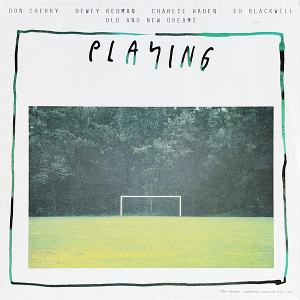
Playing is a live album by American jazz quartet Old and New Dreams recorded at the Cornmarket Theater in Austria and released on ECM the following year. The quartet consists brass section Don Cherry and Dewey Redman and rhythm section Charlie Haden and Ed Blackwell.
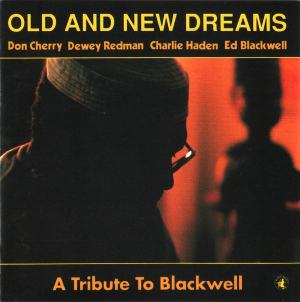
A Tribute to Blackwell is a live album by jazz quartet Old and New Dreams. Recorded in 1987, it features trumpeter Don Cherry, saxophonist Dewey Redman, bassist Charlie Haden and drummer Ed Blackwell. It was released on the Italian Black Saint label.
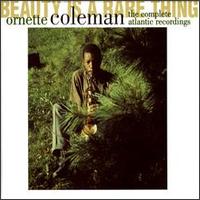
Beauty Is a Rare Thing: The Complete Atlantic Recordings is a box set by American jazz saxophonist and composer Ornette Coleman compiling his master recordings made for Atlantic between 1959 and 1961, released on Rhino Records on November 16, 1993.

Science Fiction is an album by the American avant-garde jazz saxophonist and composer Ornette Coleman, recorded in September and October of 1971 and released on Columbia Records in February 1972.

Art Deco is an album by jazz trumpeter Don Cherry recorded in 1988 and released on the A&M label. His quartet played at the Village Vanguard before recording the album.
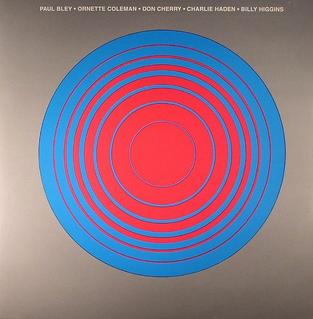
Live at the Hilcrest Club 1958 is a live album by pianist Paul Bley, saxophonist Ornette Coleman, trumpeter Don Cherry, drummer Billy Higgins and bassist Charlie Haden recorded in California in 1958 and released on the Inner City label in 1976. The album was the first live recording of Ornette Coleman, made shortly after he recorded his first album, Something Else!!!! and featuring the group that would soon record the Atlantic albums The Shape of Jazz to Come (1959) and Change of the Century (1960).
This is the discography for American jazz musician Charlie Haden.
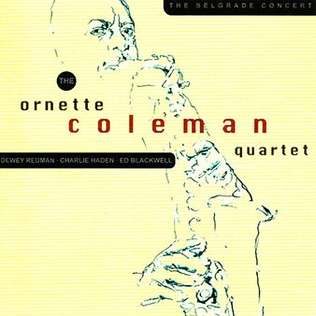
The Belgrade Concert is a live album by Ornette Coleman. It was recorded in November 1971 in Belgrade, and was released by Jazz Door in 1995. On the album, which was recorded one day after the concert documented on Live in Paris 1971, Coleman is joined by saxophonist Dewey Redman, bassist Charlie Haden, and drummer Ed Blackwell.
